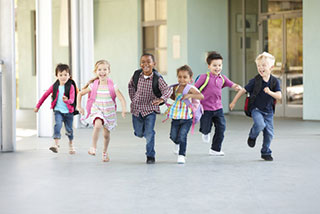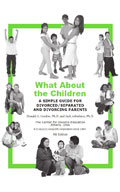
By Donald A. Gordon Ph.D. and Jack Arbuthnot Ph.D.
Divorce inevitably impacts children, but it impacts them in different ways depending on the age and stage of the children’s emotional development. Preschoolers – children ranging in age from infants to age 6 — most often react to their parents’ break-up with fear and guilt. They’re confused: young children are not able to understand what is going on and why. They think that if Dad can leave their life, Mom can too. They may think that if parents can stop loving each other, they can also stop loving them.
Young children often worry about the practical realities of their daily lives. Who will take care of them? Will there be enough food or money? Where will they live?
Every family member is affected by divorce and children are very sensitive to their emotional environment. Even babies in the first months of life react with fear and stress when parents show anger. There really is no age where children are not upset by stress in a bad relationship.
Parents will often see children go regress to early behaviors: for example, the child may want a security blanket again, or they may have problems using the toilet. There may be an increase in wanting to masturbate. They may cry, cling, or disobey. They may have night fears or fears at separation. Separation anxiety may increase with baby sitters or at preschool. There may be problems at play and they may fight more.
Children may imagine strange things about why one parent is gone. Children often think they caused the break-up; they may think Dad or Mom would not have gone if they had behaved better. If a parent is very upset, a child may hide his own feelings of distress so he won’t upset the parent.
Divorce and Children: How to Help Your Preschooler
Reassure children that BOTH Mom and Dad will continue to love them.
Young children need to be told clearly and often that their parents will take care of them, and that both Mom and Dad still love them. They need to be told that they are still a family, no matter where each family member lives.
Keep your explanations about the separation very simple and grounded. Parents need to explain in a simple way why the break-up happened; ideally this can happen before the physical separation takes place. This helps the children know that the problems are between Mom and Dad and that the break-up is not their fault.
Children at this age need reassurance and connection time with their parents. They need a chance to talk about their fears. Each parent should frequently set aside time to talk to the preschoolers about how they feel. Both parents should spend lots of time with their children.
Minimize conflict.
It’s important for parents to avoid conflict in front of the children. Young children will listen to their parents’ arguing and may think they are to blame. When violence has occurred, the safety of the children must be insured; a violent parent can help repair the harm by setting a good example of anger control. Showing respect for the other parent can undo the damage to children who have seen violence.
Give them lots of meaningful time with the other parent.
Children need to spend good one-on-one time with each parent. Most of them are very sad not to be with the absent parent more. Being separated from one parent is common in divorce, and children under three years of age often feel that even one week of being away from a parent is too long. Their sense of time is much shorter than that of older children. Infants benefit from contact with both parents every day. It can be very difficult for children to spend a lot of time with a parent they aren’t fully bonded with and in that even, briefer contacts are best. These contacts can be made longer as the bonding between the parent and child strengthens.

Related Articles
For more information about children’s issues during separation and divorce, visit www.DivorceMagazine.com – you’ll find lots of informative articles on the subject.
See also:
How Divorce Affects Young Children
How Divorce Affects Preteens
How Divorce Affects Teenagers







